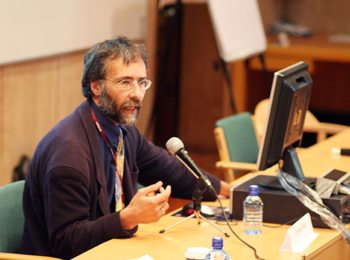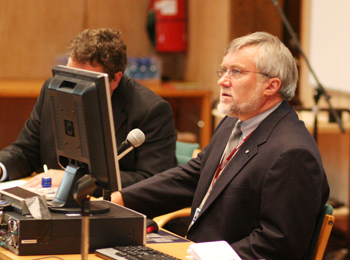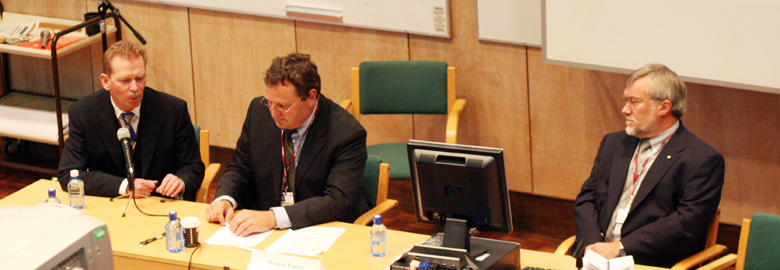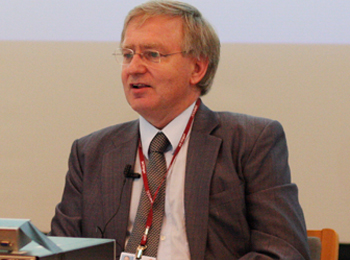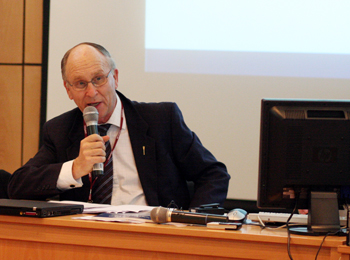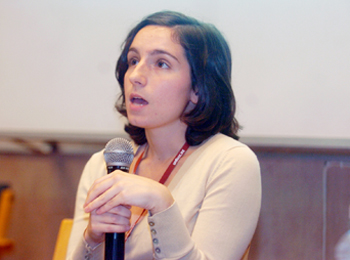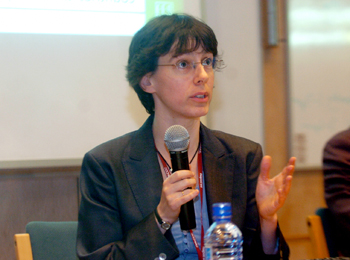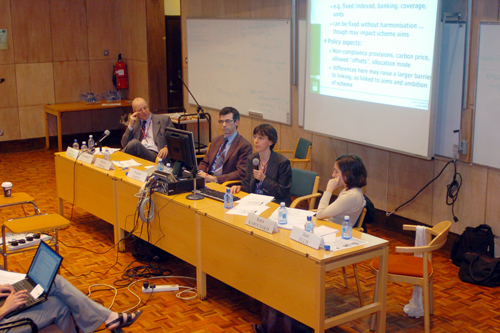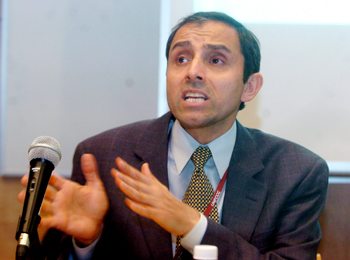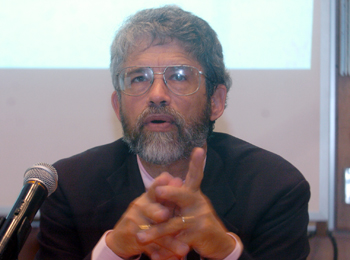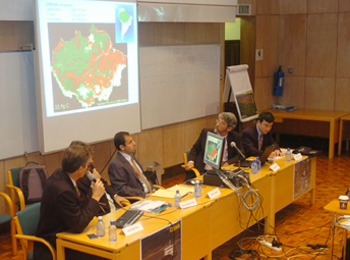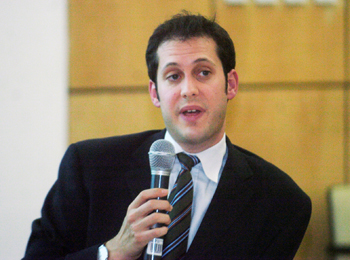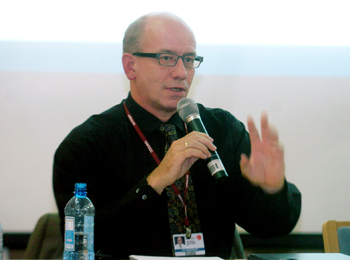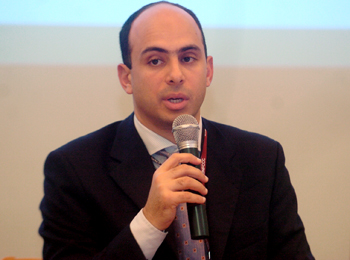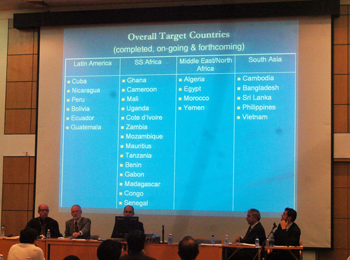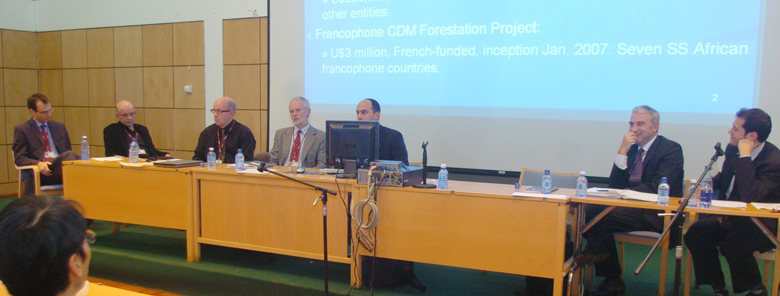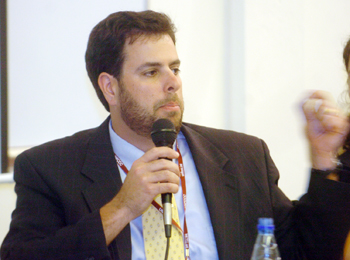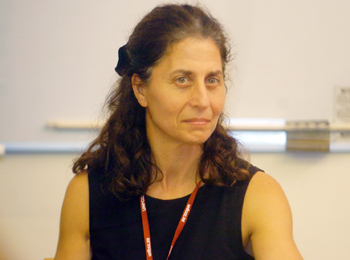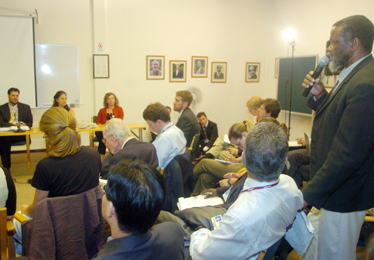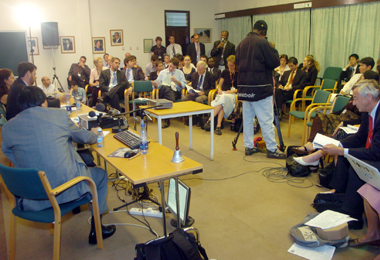 |
||
|
Published by the International Institute for Sustainable Development (IISD)
|
|||
|
A Special Report on Selected Side Events at the Second Conference of the Parties serving as the Meeting of Parties to the Kyoto Protocol (COP/MOP 2) and Twelfth Conference of the Parties (COP 12) to the UN Framework Convention on Climate Change (UNFCCC)
|
|||||
| 6-17 November 2006 | Nairobi, Kenya | |||||
 |
|||
 |
|||
Events convened on Monday, 13 November 2006
|
Climate Insurance Presented by Munich Climate Insurance Initiative |
|||
|
Peter Höppe, Munich Re Group, pointed to scientific evidence linking global warming to increased weather-related disasters worldwide. He stated that without appropriate insurance mechanisms, poor countries will see increasing ratios of development funding absorbed by disaster relief.
Ian Noble, World Bank, said the nature of the insurance industry is not such that it will "pick up" extra losses due to climate change. He highlighted the Bank’s interest in weather-indexed insurance, providing an example of a layered risk management approach in Mongolia. He emphasized that accurate and secure local data are required to develop an appropriate index such that trigger mechanisms match on-ground needs. Emily Ojoo-Massawa, Kenya National Focal Point to the UNFCCC, stated that risk can be assessed and quantified but that action to mitigate climate change is insufficient. Armin Sandhövel, Dresdner Bank, highlighted four “playing fields” for financial service products: flood and storm; weather-related insurance solutions; the carbon market; and renewable energy insurance. Adam Kirkman, World Business Council for Sustainable Development, suggested the private industry may help determine what risks are most worth insuring. |
|||
|
|||
|
OECD net energy exporters: reflecting on roles and profiles in a post-2012 climate regime Presented by IISD |
|||
|
John Drexhage, International Institute for Sustainable Development (IISD), suggested that most UNFCCC discussion regarding oil exports focus on OPEC countries, leaving out non-OPEC countries with large oil exports. He outlined an IISD study on Canada’s concerns in the post-2012 world.
Leroy Johnson, Government of Alberta, Canada, highlighted the role of technology in addressing the needs of oil exporting countries, and discussed: the links between the energy sector and climate change; the challenges of dealing with increasing climate risks; and a technology solution relevant for Canada. He noted that management of GHGs from oil sands poses one of the biggest challenges currently faced by Alberta and Canada. Stig Svenningsen, Ministry of Petroleum and Energy, Norway, argued that continuing oil exports and meeting climate goals simultaneously is a challenge for Norway, and noted ongoing work on a full-scale carbon capture and storage (CCS) facility. Frede Cappelen, Statoil, focused on ways to address the role of emerging exporters in future climate negotiations, and highlighted that national circumstance must be taken into account for future commitments. Matthew Bramley, Pembina Institute, emphasized that a disproportionate increase in oil exports is leading to high emissions. He noted that energy exporting countries are concerned that future commitment targets may require financial transfers through emission trading systems. Participants discussed the relevance of CCS technology, the certainty of CCS coming into operation and the possibilities of CCS inclusion into CDM. |
|||
|
|||
|
Adaptation, mechanisms and technology: recent work from the Annex I Expert Group Presented by OECD |
|||||
|
Dennis Tirpak, OECD, overviewed an OECD paper outlining that weak, immature and poorly implemented policy frameworks contribute to countries’ vulnerability to climate change in the water sector. Rick Bradley, OECD, discussed barriers to the technical diffusion of compact fluorescent lamps, noting that barriers differ depending on the host country. Richard Baron, OECD, highlighted that policies to support solar thermal energy are lagging behind policies supporting other forms of renewable energy sources, despite its high use relative to many renewables. Katia Karousakis, OECD, discussed policies and incentives to reduce GHG emissions from deforestation. She argued for the need to estimate the “total value of forests” and outlined various options to capture forest and carbon values. Baron then presented four sectoral approaches to reduce GHG emissions, emphasizing that sectoral approaches could engage developing countries without requiring country-wide commitments. Jane Ellis, OECD, outlined potential linkages between different emissions trading and “offset” schemes. Noting that few linkages currently exist, she discussed the technical, policy and distributional issues likely to influence the potential for, and extent of, post-2012 linkages. On Joint Implementation (JI), Karousakis argued that the creation of the Joint Information Systems Committee, under the guidance and authority of the COP/MOP, has eliminated some uncertainty surrounding JI and highlighted some current and emerging issues relating to JI. |
|||||
L-R: Dennis Tirpak, Richard Baron, Jane Ellis, and Katia Karousakis, OECD
|
|||
|
Climate policy and development in emerging economies Presented by WHRC |
|||
|
John Holdren, Woods Hole Research Center (WHRC) and Harvard University, outlined a WHRC study, whose objective was to promote existing and prospective “win-win” approaches for reducing “climate-altering” emissions while advancing other climate goals in Brazil, China and India.
Daniel Nepstad, WHRC, noted that the Brazilian sub-component of the study focused on developing approaches to the reducing large-scale emissions in the Brazilian Amazon and highlighted the efforts of the federal government to protect it. Paulo Mountinho, Amazon Institute for Environmental Research and WHRC, said that civil society in Brazil is prepared to discuss proposals for tropical deforestation mitigation in international negotiations, highlighting President Lula’s recent announcement reflecting positively on the “compensated reduction proposal.” Ji Zou, Renmin University of China, explained that the China sub-component focused on reducing energy intensity in the Chinese automotive and other vehicle sectors. He noted that the study will also assess some economic and environmental options for deployment of advanced coal technologies. Ambuj Sagar, Harvard University, noted that the Indian sub-component was based on already-existing mitigation studies and focused on various aspects of biomass and coal resource use. Participants discussed, inter alia: why funding is needed for protecting forests in the Amazon; the high amount of deaths resulting from indoor air pollution; the need for promoting environmental education; the need for small-scale research on adaptation; improvement in rural energy services; and the need for making technology solutions work at the grassroots level. |
|||
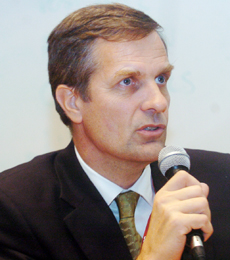 |
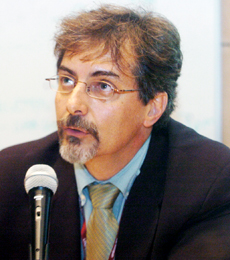 |
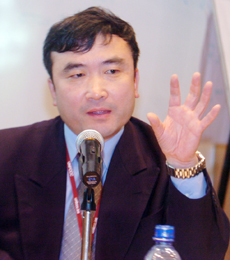 |
|||||
|
Daniel Nepstad, WHRC
|
Paulo Mountinho, Amazon Institute for Environmental Research and WHRC
|
Ji Zou, Renmin University of China
|
|||||
|
|||
|
Supporting successful implementation of CDM projects Presented by UNEP Risø Centre |
|||
|
John Christensen, UNEP Risø Centre (URC), highlighted the importance of UNEP and URC activities on building capacity for implementing CDM projects.
Ton van der Zon, Ministry of Foreign Affairs, the Netherlands, underscored the need to ensure CDM’s capacity to promote sustainable development and strengthen Designated National Authorities' ability to define CDM portfolios at national levels. He said URC faces the challenge of assisting Africa in developing CDM activities. Sami Kamel, URC, summarized UNEP and URC’s in-country and global-level activities on CDM capacity building, highlighting technical assistance projects and successful indicators. He said such activities: contribute to reducing transaction costs; facilitate project financing and access to carbon markets among LDCs; assist host countries in becoming CDM destinations; and improve market efficiency. Jorgen Fenham, URC, summarized analytical results from the CDM pipeline and database, and highlighted the most important information from all project design documents (PDDs) and methodologies. Daniele Violetti, UNFCCC Secretariat, informed that the CDM Executive Board (EB) has indicated the establishment of the CDM bazaar as a tool to address the issue of inequitable geographical distribution of CDM projects. He said a preliminary version of the bazaar covering supply of, and demand for, CDM projects will be launched as soon as possible. Glenn Hodes, URC, noted the large scope for modern bioenergy alternatives for the transport sector and pointed out that priority should be given to consumer biofuels if atmospheric benefits are to be achieved. Einar Telnes, DNV, underscored pitfalls in monitoring CDM projects, including: lack of logic and consistency in PDDs; insufficiently justified deviations from selected calculation methodologies; insufficiently covered compliance with local legal requirements; and insufficient information on the stakeholder consultation process. Francisco Ascui, EcoSecurities, summarized approaches and lessons learned on financing CDM projects and noted that a guidebook on the issue will be available shortly. He highlighted financial challenges faced by CDM projects and sources and types of finance available, such as carbon funds, private sector CDM developers and project hosts. |
|||
L-R: Francisco Ascui, EcoSecurities; Jorgen Fenham, URC; John Christensen, UNEP Risø Centre (URC); Ton van der Zon, Ministry of Foreign Affairs, the Netherlands; Sami Kamel, URC; Daniele Violetti, UNFCCC Secretariat; and Glenn Hodes, URC
|
|||
|
US re-engagement Presented by USCAN |
|||
|
Gary Cook, US Climate Action Network (USCAN), highlighted the implications of US mid-term elections on US climate change approach.
Jeremy Symons, National Wildlife Federation, noted a power shift in the US due to changes in the Congress, which adds momentum to climate action at the national level. He emphasized that, despite Bush’s administration's climate policy, States and local communities are implementing activities and policies to mitigate GHG emissions and adverse climate change effects. Symons highlighted increased public awareness regarding global warming and its consequences. He said the mid-term elections’ result will not change US policy at the international level before 2009, stressing that focus will be on implementing national policies. Annie Petsonk, Environmental Defense, noted that her organization co-sponsored California’s legislation establishing a target of 80% GHG emission reductions by 2050, compared to 1990 levels. She expressed hope that California’s action will be followed by other States, and that these will be linked to other countries’ efforts to combat climate change. Lisa Jacobson, Business Council for Sustainable Energy, underscored that, in spite of election results, there has been a movement within the business arena to deal with national climate change issues. Michael Goo, Committee on Environment and Public Works, US Senate, said US mid-term elections reflect that the Bush administration’s climate change policy “has run its course.” He forecasted future US climate policy will include: taking early action now for reducing costs to avoid adverse effects; continuing to work with the UNFCCC; and enabling the US to “take its right place in the system of a fully developed mandatory limit.” |
|||
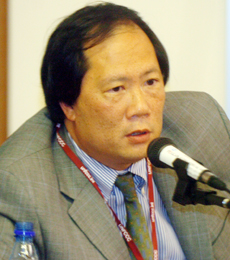 |
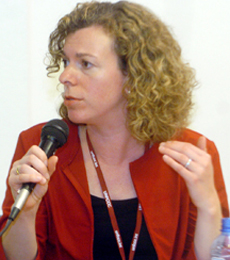 |
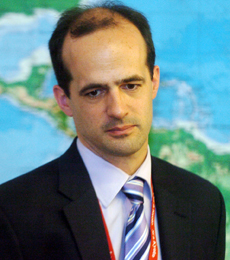 |
|||||
|
Michael Goo, Committee on Environment and Public Works, US Senate
|
Lisa Jacobson, Business Council for Sustainable Energy
|
Gary Cook, US Climate Action Network (USCAN)
|
|||||
|
|||
|
||
|
Click the above button to go back to our ENB main coverage
|
||
|
|
|
|
|
||
|
